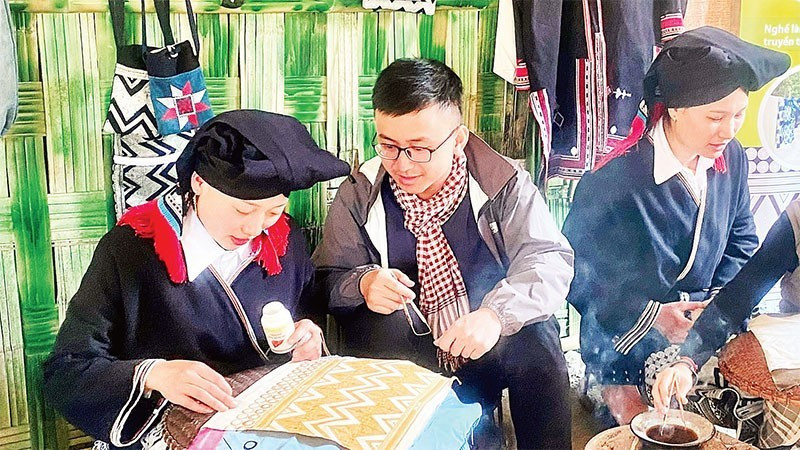Sustainable livelihoods through community-based tourism
Ethnic minority communities of Muong, Thai, H’Mong and Dao in Phu Tho province are actively developing community-based tourism as a new pathway to improve both material and spiritual living standards, gradually building a more prosperous and fulfilling life.

Located in the core zone of the Hoa Binh reservoir, Ngoi village in Muong Hoa commune once had no sources of income other than fishing and forestry. It was not until private enterprises arrived under investment attraction policies that local people began to engage in tourism, tapping into the area’s natural strengths and untapped potential.
Home to more than 100 Muong households, Ngoi village boasts not only pristine natural landscapes but also nearly intact traditional stilt houses and rich cultural practices of the Muong people. Bui Van Hien, owner of Chuong Gio homestay in the village, shared that with the support of Hoa Binh Tourism Joint Stock Company, the local community experienced a shift in mindset and awareness.
Several households took the initiative to upgrade facilities and invest in homestays offering food, accommodation, and diverse cultural experiences. Visitors to the village can enjoy the tranquil beauty of the Hòa Bình reservoir and Ngoi Hoa Bay, explore Muong culture, and take part in activities such as rowing, fishing, and aquaculture.
Compared with other community-based tourism destinations in Phu Tho province, Hang Kia and Pa Co remain relatively new but have quickly become a draw for both domestic and international tourists. These areas captivate visitors not only with their natural landscapes but also with their distinctive local cultures, preserved through language, clothing, and daily customs.
Households engaged in community tourism have been proactive in improving service quality and introducing new experiential products, such as the H’Mong cultural night market in Pa Co; traditional fabric weaving and dyeing; tea picking; and authentic mountain cuisine rich in the flavours of the Northwest.
To date, community-based tourism in the broader Hoa Binh area (prior to administrative changes) has seen significant growth, particularly through the promotion of ethnic minority cultures. Key clusters are found in Mai Chau, Da Bac, Muong Bi and Thung Nai communes.
In Mai Chau commune alone, there are eight community-based tourism sites—six run by the Thai ethnic group and two by the H’Mang. In Da Bac, there are four Muong sites and one run by the Dao community. Tan Lac has four Muong-run sites, while Cao Phong has three.
According to Bui Xuan Truong, Deputy Director of the Department of Culture, Sports and Tourism of Phu Tho province, this is a culturally diverse area where the Muong people account for approximately 64% of the population, followed by Kinh, Thai, Dao, Tay and H’Mong communities. In recent years, community-based tourism has received strong encouragement from the province.
In addition to policies from the Party and the State, several non-governmental organisations have also supported ethnic minority communities in developing tourism models. The region now boasts more than 20 community tourism sites and nearly 200 operational homestays offering accommodation and tourism services. These sites have engaged around 1,000 people—many of them poor or from ethnic minorities.
Beyond preserving and promoting cultural heritage, community-based tourism has created sustainable livelihoods for ethnic minority groups through the provision of tourism services such as lodging, dining, cultural experiences, and local souvenirs.
Notably, several destinations have successfully built strong reputations and earned the favour of both domestic and international tourists, such as Lac Village (Mai Chau), Mo Village (Thung Nai), Da Bia Hamlet (Tien Phong), and Sung Village (Cao Son). Each site offers distinct, non-replicated tourism products that showcase cultural identity and deliver memorable experiences.
With its natural landscapes and rich ethnic heritage, community-based tourism is shaping a sustainable development path, gradually transforming local approaches to economic growth. The province is orienting the development of this model in connection with sustainable agriculture, environmental conservation and cultural preservation. Ethnic minority households are not only supported through investments in infrastructure, such as transport, electricity, and cultural facilities, but also receive regular training to improve tourism skills.
Today, community-based tourism sites are playing a vital role in accelerating poverty reduction. Households engaged in tourism services earn significantly higher incomes than those not involved. Traditional handicrafts are also enjoying a revival, generating more jobs for locals. The growth of community tourism is bringing a new face to rural areas. Formerly part of Hoa Binh province, these localities now aim to invest in infrastructure for 290 community tourism households and welcome over 1.6 million visitors by 2030.
Building on these targets, Phu Tho province has identified tourism as a key economic sector and a leading destination in the Northwest region, with the potential to attract an increasing number of domestic and international travellers. The province also encourages continued collaboration and joint ventures with investors to unlock local tourism potential. Efforts are being made to boost investment promotion, enhance tourism product quality, and transform the regional landscape and economic structure, paving the way for sustainable tourism development.








